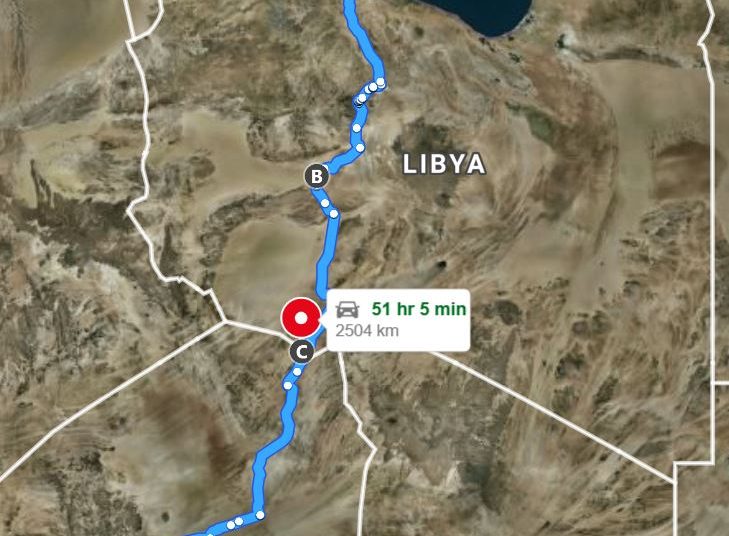A report on the Misrata – Tamenhint – Agadez Transit Trade Road says the project has positive economic, political, social, and security benefits. These benefits are not only for Libya and Niger, through which the road passes, and even neighbouring Chad on one level, but also for the CEN-SAD Community of Sahel-Saharan states and Europe and trading states such as China.
It estimates that the project will cost an estimated US$ 3.2 bn (at 2023 costing) and would need about 40 months from planning to completion.
The report dated November 2022 was prepared by a committee formed by the Tripoli based Libyan government of Abd Alhamid Aldabaiba through decree 263 of 2022.
From Misrata, on the Mediterranean coast, to Agadez, located in central Niger, the route is 2,320 km long. The section within Libya measures 1,320 km.
The Libyan section is currently in use, but many sections are dirt tracks or badly potholed and was contracted by Libya’s Ministry of Transport for repairs.
The offshore Africa Trade and Investment Company
The 1,000 km section inside Niger was also contracted for implantation by the Africa Trade and Investment Company during the Qaddafi regime in 2008. The Africa Trade and Investment Company is an offshore company wholly owned by the Libyan state and registered in Mauritius.
Transit road implementation stopped in 2011
Implementation started in 2009 but stopped with the 2011 Libyan February revolution that ended the Qaddafi regime. About 2 percent of the road was completed. The contract includes 8 service points along the route.
Recommendations
Funding via a mixture of PPP / international / regional organisations
The report says the project is unlikely to be fully funded by the Libyan state budget but a portion for planning and design may have to be state funded. It recommends that the best options are a mixture of private sector, international and regional funding organisations, or PPP. These include the Cen-Sad Bank, the African Bank for Development, the Islamic Bank, and the IMF/WB.
It also recommends building the Libya section of the road under Privatisation and Investment Board’s (PIB) Investment Law no. 9 of 2010 to attract investors.
BOT
The construction contract should be through the build, operate, transfer (BOT) option for a 30-to-40-year period before returning the road to the Libyan state.
Continue with the Africa Trade and Investment Company
The report recommends that implementation is continued with the contracted Africa Trade and Investment Company as it has previous experience in implementing roads in Africa.
Use existing Manmade River and railway road as foundation
Rather than build a brand-new road in Libya, the committee advised the use of the existing Manmade River Road and railway road where possible to save time and money.
It recommends the design of a sealed, protected and monitored dual carriageway to be protected by security forces in Libya and Niger.
Return on investment
The committee recommends the transit trade road charges tolls to users to generate a revenue stream and return money financed by investors.
It also recommends running a renewable energy (solar) line along the road to operate the road and its facilities which would over time export its excess energy to Europe and Africa.
Along the length of the transit trade road services such as hotels, cafes, restaurants etc, would be established to both provide needed services and earn revenues.
TIR
It also recommends using the international custom transit system (TIR) which allows companies to transit trade across borders without paying customs or unloading goods.
The Convention on International Transport of Goods Under Cover of TIR Carnets is a multilateral treaty that was concluded at Geneva on 14 November 1975 to simplify and harmonise the administrative formalities of international road transport.
March 2023 MoU with Niger to start transit trade road construction
It will be recalled that in March this year Libya and Niger signed an MoU on the start of the construction of the transit trade road between the two neighbouring countries.
The MoU was signed in the capital of Niger, Niamey, during the inauguration of the ‘‘Made in Libya’’ Forum and Exhibition held under the slogan ‘‘Niger, the land of promising opportunities and transit trade’’.
Preparations for the second ‘‘Made in Libya’’ edition in Niamey, Niger progressing (libyaherald.com)









